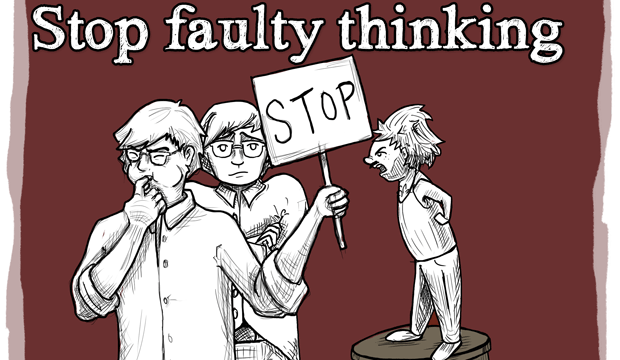We are in an extraordinary historical juncture. There is a current world-wide pandemic causing 150,000 deaths in in the U.S. alone in the last six months. How to act during this scary and turbulent period is self-evident for some but not so obvious to others. How, I ask, can anyone not promote wearing masks and social distancing when these are the strongest defenses we have against the deadly virus? Why does a rational individual, conscious of what a poor decision is, make it anyhow? How can we interpret this degree of ignorance? Or to say it another way: How can we understand faulty thinking?
Consider the efforts of President Trump and the Governor of South Dakota recently. The President refuses to wear a mask in public, and does not promote wearing one, because it makes him appear weak, unmanly, and not in control. He seems to care more about his self-perception rather than the health of the society at large. The evidence is incontrovertible that his selfishness and paucity of empathy explains his faulty judgment. But what explains the actions of the Governor? A Republican, Gov. Kristi Noem is following the lead of the President. While inviting thousands of people to attend the Mt Rushmore celebrations for the 4th of July, she won’t make masks mandatory, nor will she promote social distancing.
As a thoughtful cognitive scientist, I am dismayed and yet fascinated by such wrong-headed and dangerous rationale. Mass gatherings with no social distancing and optional masks inevitably will increase the number of infections and undoubtedly the deaths of some of the attendees. The logic of these leaders may result from a paucity in considering all alternatives, erroneous judgment, or absence of compassion in the face of objective evidence to the contrary.
Psychologists describe a specific cognitive tendency that occurs in individuals called confirmation bias that may explain features of their attitude. Confirmation bias is the tendency to search for, interpret, favor, cherry-pick and recall material that confirms or supports one’s personal opinions or values. Confirmation bias distorts evidence-based decision-making.
Anti-maskers and anti-social distancing folks argue that their essential rights are being abridged during the pandemic: the freedom to associate and to do as they want. In their minds, such basic rights “trump” medical considerations. For me, it’s tantamount to declaring that having a gratifying time is more important than protecting life against a destructive virus. It is hard logic to understand. Since confirmation bias tunes people toward confirming their preexisting convictions, it may explain why it is mainly Republicans that react skeptically to health directives.
Psychologists note that explanations for confirmation bias include wishful thinking and the lessened readiness to process information. Another explanation is that people may consider the cost of being incorrect, rather than responding in an evenhanded, objective manner. These are attributes of President Trump’s and Gov. Noem’s responses.
Confirmation bias leads to “attitude polarization” (when a conflict becomes more severe, even when the parties receive the same evidence), and other such erroneous reasoning. It suggests that faulty thinking promotes more faulty thinking.
In the essay Why Facts Don’t Change Our Minds published in the New Yorker, Elizabeth Kolbert points out the limitations of reason. She shows why sensible folks are often foolish. Kolbert bases her conclusions on the work of cognitive scientists, Hugo Mercier and Dan Sperber. Their argument is an unexpected and fascinating explanation for stupidity. They state that reason is an evolved character, like bipedalism or three-color vision; We developed this trait because of our skill at cooperating; And to work out the dilemmas posed by living in collaborative groups. That is, being stupid is sometimes advantageous. The problem is that often we apply this behavior in the wrong situation.
Mercier and Sperber suggest that a mouse with confirmation bias “bent on confirming its belief that there are no cats around,” would quickly become supper. The human equivalent of this confirmation bias, leading individuals to dismiss evidence of recent or underappreciated threats, is a quality that should have disappeared through evolution. But because it has survived, they explain, it must have some adaptive function. They relate this to our “hyper sociability.” We developed reason, they say, to prevent us from getting screwed by the diverse members of our group.
Sociability is the key to how the human mind functions or malfunctions. We depend on others more than we realize. For most things we need not understand the world to live in it because someone else has understood it and we entrust them to have done it right. Think of how we use devices like our computers, smartphones, etc. without substantial awareness of how they work. We trust those who built these gadgets. Thus, partial, flawed, or “stupid” thinking is irrelevant in such circumstances. It may actually be empowering. But we carry that attitude into other areas of life where it is not a smart thing to do. Politics being one.
As Kolbert says, “If we all now dismiss as unconvincing any information that contradicts our opinion, you get, well, the Trump Administration.”

